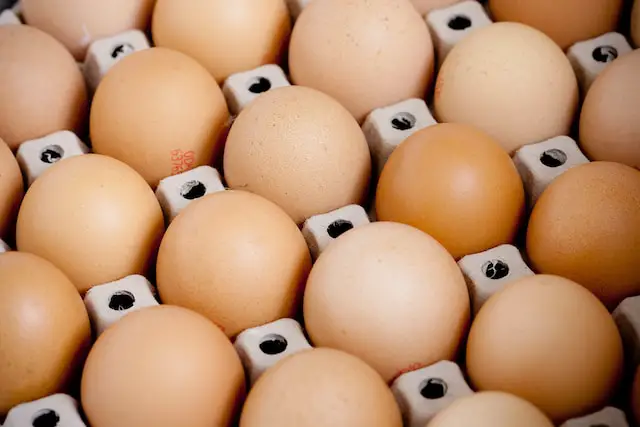Why Are Eggs So Expensive In Iowa?
The cost of eggs in Iowa has been on the rise in recent years, and this trend has left many consumers wondering what is driving the high prices. A combination of factors has contributed to the increase in egg prices, including the avian influenza outbreak, feed costs, and changes in egg production methods.
In 2015, Iowa experienced the largest outbreak of avian influenza in U.S. history. The virus quickly spread, leading to the loss of over 31 million birds in the state alone. This loss had a significant impact on the egg industry, resulting in a decrease in egg production and a corresponding rise in egg prices. As the supply of eggs decreased, the demand for them remained constant, leading to higher prices for consumers.
Feed costs also play a significant role in the cost of producing eggs. The cost of feed has been rising steadily in recent years, leading to increased production costs for egg producers. These increased costs are then passed on to consumers in the form of higher prices. In addition to the cost of feed, egg producers must also contend with the cost of labor, equipment, and other expenses associated with egg production.
The Iowa State University Egg Industry Center has been studying the impact of these factors on the egg industry in Iowa. Maro Ibarburu, an associate professor of economics at Iowa State University, has noted that the high prices of eggs may be difficult for some families, but they are not necessarily bad for the industry as a whole. The increased prices can help egg producers remain profitable and encourage innovation in the industry.
The Iowa Department of Agriculture has also been working to support egg producers in the state. They have assisted egg producers who were impacted by the avian influenza outbreak and other market factors. The Department of Agriculture has also been promoting the industry and encouraging consumers to buy local eggs. This support has helped to stabilize the industry and ensure that consumers have access to high-quality eggs.
Despite these efforts, the cost of eggs in Iowa remains high. According to data from the Bureau of Labor Statistics, the consumer price index for eggs in the Midwest region has increased by 45% since 2015. This increase means that consumers are paying significantly more for eggs than they were just a few years ago.
The high prices of eggs have also impacted the grocery store industry. Some stores have had to raise their prices for eggs to cover the cost of acquiring them from egg producers. Others have had to limit the number of eggs they sell to each customer. The high cost of eggs has also led some consumers to seek out alternative food items to use in their cooking and baking.
One potential solution to the high cost of eggs is to increase the number of egg-laying hens in Iowa. According to the Iowa Egg Council, there are currently over 58 million egg-laying hens in the United States, with over 14 million in Iowa alone. Increasing the number of hens could help to boost egg production and bring down the cost of eggs for consumers.
In conclusion, the high cost of eggs in Iowa can be attributed to a combination of factors, including the avian influenza outbreak, rising feed costs, and changes in egg production methods. While these factors have had a significant impact on the egg industry in Iowa, efforts by the Iowa Department of Agriculture and the Iowa State University Egg Industry Center have helped to stabilize the industry and ensure that consumers have access to high-quality eggs.
Looking ahead, increasing the number of egg-laying hens in Iowa may be one way to help bring down the cost of eggs and make them more accessible to consumers, especially during the holiday baking season.
Frequently Asked Questions
What cheer Iowa?
What Cheer is a small city in the southeastern part of Iowa, United States. The city has a population of around 600 people and is located in Keokuk County. It was named after a Native American greeting which means “hello” or “what news?” and was originally settled in the mid-1800s as a coal mining town.
Today, What Cheer is known for its historic downtown area, which features several well-preserved buildings from the late 19th and early 20th centuries. The town is also home to several annual events, including the What Cheer Flea Market, which is one of the largest flea markets in the Midwest, and the What Cheer Opera House, which hosts a variety of live performances throughout the year.
What is Iowa known for?
Iowa is a state located in the Midwestern region of the United States. It is known for several things, including:
1. Agriculture: Iowa is known as one of the top agricultural states in the country, with a focus on corn, soybeans, and pork production.
2. Education: Iowa is home to several reputable colleges and universities, including the University of Iowa, Iowa State University, and Drake University.
3. Sports: Iowa is known for its passionate sports fans, particularly in football and wrestling. The University of Iowa’s football and wrestling teams have a strong following, and the state also hosts the Iowa State Fair, which features a range of athletic competitions.
4. Landmarks: Iowa is home to several landmarks, including the iconic covered bridges of Madison County and the Field of Dreams movie site in Dyersville.
5. Culture: Iowa has a rich cultural heritage, including a strong tradition of folk music and dance, as well as a thriving arts scene in cities like Des Moines and Cedar Rapids.
Overall, Iowa is known for its agricultural roots, educational institutions, sports culture, landmarks, and vibrant cultural scene.
What is the capital of Iowa?
The capital of Iowa is Des Moines. It is the most populous city in the state, with a population of over 217,000 people. Des Moines is located in the central part of Iowa and is known for its vibrant downtown area, which features several high-rise buildings, as well as numerous restaurants, bars, and entertainment venues.
It is also home to the Iowa State Capitol building, which houses the offices of the governor and the state legislature. Des Moines is a major center for business and industry in Iowa, with a focus on insurance, finance, and technology.
What is the minimum wage in Iowa?
The minimum wage in Iowa is $7.25 per hour, which is the same as the federal minimum wage. However, some cities and counties in Iowa have enacted minimum wage ordinances that require higher wages for employees within their jurisdiction.
For example, the city of Johnson has set its minimum wage at $10.10 per hour, while Linn County has set its minimum wage at $10.25 per hour. It’s important to note that employees in certain industries, such as tipped workers and agricultural workers, may be subject to different minimum wage rates and exemptions under Iowa law.
How many people live in Iowa?
According to the United States Census Bureau, the estimated population of Iowa as of 2023 is around 3.2 million people. The state has a diverse population, with a mix of rural and urban communities. Des Moines, the state capital and largest city, has a population of over 217,000 people. Other major cities in Iowa include Cedar Rapids, Davenport, Sioux City, and Iowa City.
What to do in Iowa?
Iowa offers a range of activities and attractions for visitors and residents alike. Here are some things to do in Iowa:
1. Visit the Bridges of Madison County: This collection of historic covered bridges in Madison County is a must-see for any visitor to Iowa.
2. Explore the Iowa State Capitol: Take a tour of the impressive Iowa State Capitol building in Des Moines, which features a striking gold dome and stunning architecture.
3. Experience the Iowa State Fair: Held annually in August, the Iowa State Fair is a beloved event that offers a range of attractions, including livestock exhibits, concerts, carnival rides, and food vendors.
4. Explore the Great River Road: Drive along the scenic Great River Road, which follows the Mississippi River and offers breathtaking views of the river and its surrounding landscape.
5. Visit the Amana Colonies: This group of historic villages in eastern Iowa was founded by German immigrants in the 19th century and offers a unique look at Iowa’s cultural heritage.
6. Discover Iowa’s State Parks: Iowa is home to over 80 state parks, which offer opportunities for hiking, camping, fishing, and other outdoor activities.
7. Visit the Field of Dreams Movie Site: Fans of the classic film “Field of Dreams” can visit the actual movie site in Dyersville, Iowa, which includes a baseball field and gift shop.
8. Learn about Iowa’s history: Iowa is home to several museums and historic sites, including the Herbert Hoover Presidential Library and Museum, the National Mississippi River Museum and Aquarium, and Living History Farms.
These are just a few of the many things to see and do in Iowa. Whether you’re interested in history, culture, outdoor activities, or simply enjoying the state’s natural beauty, there is something for everyone in Iowa.
What is the abbreviation for Iowa?
The two-letter postal abbreviation for Iowa is “IA”.
How much are eggs in Iowa?
The price of eggs in Iowa can vary depending on several factors, such as the type of eggs (e.g., conventional, organic, cage-free), the brand, and the location of the store. As of May 2023, according to the Bureau of Labor Statistics, the average price for a dozen large Grade A eggs in the Midwest region (which includes Iowa) was $3.3.
However, prices can fluctuate throughout the year due to factors such as supply and demand, seasonal changes, and weather conditions affecting feed costs and egg production. It’s best to check with local grocery stores or markets for current prices.
What state are eggs most expensive?
The price of eggs can vary by region and state based on factors such as production costs, transportation, and consumer demand. As of May 2023, according to the Bureau of Labor Statistics, the average price for a dozen large Grade A egg was highest in Hawaii, where it was $9.7.
Other states with relatively high egg prices include Alaska, California, and Oregon. However, prices can fluctuate throughout the year and can also vary depending on the type of eggs and brand. It’s best to check with local stores or markets for current prices in your area.
Does Iowa produce the most eggs?
Yes, Iowa is the top egg-producing state in the United States. According to data from the USDA’s National Agricultural Statistics Service, Iowa produced over 16 billion eggs, which accounted for approximately 20% of the nation’s total egg production. Other leading egg-producing states include Ohio, Indiana, Pennsylvania, Texas, and California. However, Iowa has been the top egg-producing state for many years due to its favorable climate, available land, and advanced agricultural infrastructure.
Why is there an egg shortage?
Egg shortages can occur due to a variety of factors such as changes in consumer demand, supply chain disruptions, or natural disasters. One of the most significant factors that can lead to egg shortages is disease outbreaks affecting egg-laying hens.
For example, in 2015, the United States experienced a significant avian influenza outbreak that resulted in the loss of millions of egg-laying hens. The outbreak caused egg prices to increase and led to shortages of certain types of eggs, such as organic or cage-free, as well as processed egg products like liquid eggs and mayonnaise.
In addition to disease outbreaks, weather events such as hurricanes or extreme heat can also impact egg production and cause temporary shortages. Changes in consumer demand, such as a sudden increase in demand for eggs due to a popular diet trend, can also lead to temporary shortages as suppliers struggle to keep up with demand.
Overall, egg shortages are typically temporary and are often resolved as the supply chain adjusts to changing conditions.
Why are supermarkets running out of eggs?
Supermarkets may run out of eggs due to a variety of factors, including changes in consumer demand, supply chain disruptions, or production issues. Some of the most common reasons that supermarkets may run out of eggs include:
1. Seasonal changes: During holiday baking seasons, such as Thanksgiving or Easter, demand for eggs can increase, causing shortages or price increases.
2. Weather events: Extreme weather, such as hurricanes or winter storms, can disrupt supply chains and cause shortages or delays in egg deliveries.
3. Production issues: Factors such as disease outbreaks or production inefficiencies can cause temporary shortages of eggs in the market.
4. Transportation disruptions: Issues with transportation, such as delays or breakdowns, can lead to delays in the delivery of eggs to supermarkets.
5. Panic buying: In times of uncertainty or crisis, such as during the pandemic, consumers may engage in panic buying and stockpiling of essential goods, leading to temporary shortages of products like eggs.
Overall, supermarkets may run out of eggs due to a combination of factors, some of which may be beyond their control. However, shortages are typically temporary and resolved as the supply chain adjusts to changing conditions.
Why are supermarkets not selling eggs?
It is unlikely that supermarkets are not selling eggs at all, as eggs are a staple food item and an essential ingredient in many recipes. However, there may be instances where certain supermarkets or stores may temporarily run out of eggs due to factors such as:
1. Supply chain disruptions: Issues with transportation, production, or distribution may lead to delays or shortages of eggs in the market.
2. Changes in consumer demand: Changes in consumer behavior, such as an increase in demand for certain types of eggs or a shift towards alternative protein sources, may cause supermarkets to adjust their egg offerings.
3. Quality issues: Supermarkets may remove eggs from their shelves if they suspect quality or safety issues, such as contamination, are present.
4. Product recalls: In rare cases, eggs may be recalled due to potential health hazards, such as salmonella contamination, which could result in supermarkets temporarily removing affected products from their shelves.
Overall, while there may be instances where supermarkets temporarily do not have eggs available, it is typically due to supply chain or quality issues and is generally resolved as the situation is addressed.













